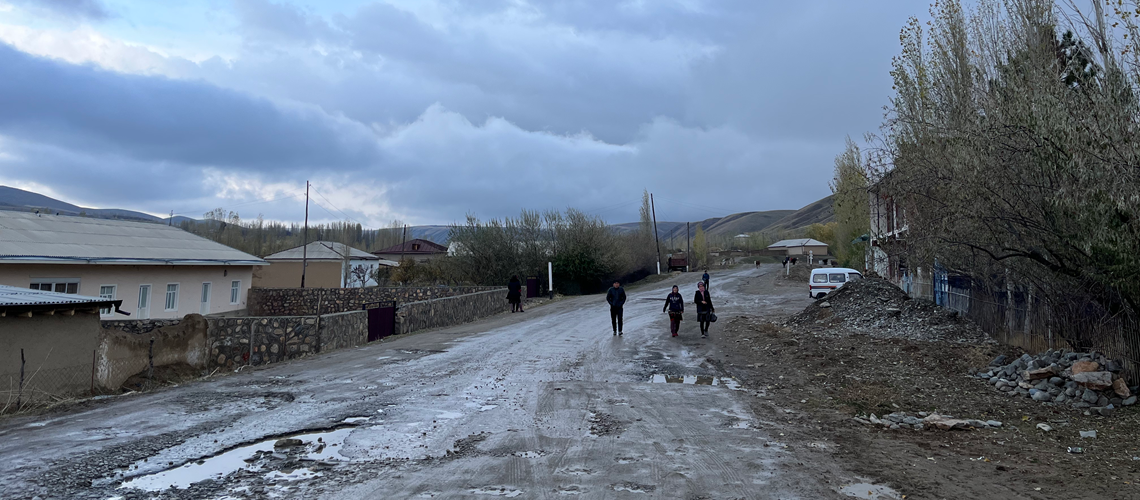Globally, people with disabilities are up to four times more likely to die from natural disasters than people without disabilities, and despite 15% of the world’s population living with a disability, their needs are not adequately taken into account in climate change adaptation efforts.
“Around the world, people with disabilities are up to four times more likely to die from natural disasters than people without disabilities.”
We heard this firsthand in Uzbekistan in November 2022, five months before a devastating landslide hit a village in Jizzakh province, destroying homes, damaging infrastructure and killing several people. These disasters occurred against a backdrop of alarming climate change projections for the country, including rising temperatures and intensifying droughts, floods and wildfires.
The World Bank team interviewed approximately 20 people with disabilities in six villages and several urban areas in Jizzakh, Syrdarya and Tashkent Oblasts. The aim of our fieldwork was to explore the vulnerability to climate change faced by people with disabilities. Among those interviewed was Shazod, a resident of Jizzakh province, who shared experiences and concerns common to many of our respondents: he relies on a makeshift plastic walking stick and would only be able to navigate the rough, unpaved roads in his village with help if he were to flee.
This field research and 40 interviews conducted with staff from disability rights organizations in Uzbekistan demonstrate the need for disability-inclusive planning as part of climate change adaptation. Our findings are detailed in a new World Bank report, “Climate Change and Disability Inclusion in Uzbekistan,” which can be found in Uzbek here.
Like many countries, Uzbekistan will suffer significant vulnerabilities from climate change. Droughts, extreme heat, erratic rainfall, landslides, water shortages and air pollution are expected to become more frequent and severe. The drying up of the Aral Sea, once the world’s fourth largest lake, is causing serious problems for large parts of the country.
The interviews revealed that people with disabilities are significantly excluded from social and political life: almost all respondents were confined to their homes and had limited interactions with people outside their households due to societal discrimination, a lack of assistive devices and inadequate public infrastructure.
The majority of respondents did not attend local government meetings. The lack of political participation is partly due to building space. The rural mahalla (community) buildings we visited had steep staircases without handrails or ramps, making them inaccessible for people with physical disabilities.
How Exclusion Increases Risk
The social and political exclusion of people with disabilities increases their risks in the context of climate change. Studies have highlighted the importance of community participation in climate change adaptation and the key role of social capital in pre-disaster preparedness and post-disaster recovery. The marginalized position of people with disabilities prevents them from actively participating in social networks and local governance, weakening their voice in local decision-making regarding climate change adaptation.
Respondents described difficulties accessing government agencies to secure medical evaluations, assistive devices, and disability pensions. These barriers are particularly high in rural Uzbekistan, where villages can be far from district centers and public transport is limited and often inaccessible to people with disabilities. One female respondent with a spinal cord injury noted that local authorities did not provide adequate support in accessing medical services.
“The marginalized position of people with disabilities prevents them from active participation in social networks and local governance, and suppresses their voice in local decision-making on climate change adaptation.”
Disaster management concerns
Additionally, respondents expressed concerns about the disaster management system. People with mobility problems pointed to the poor condition of roads needed for evacuation. Respondents with visual or hearing impairments believe they cannot rely on public emergency alerts, such as television, because sign language interpretation is often not available. Instead, they need someone they trust to relay this news to them, which may mean they do not get immediate help in an emergency.
These findings are consistent with the findings of a global online survey conducted by the UN Office for Disaster Risk Reduction in 2023. Only 8% of people with disabilities said that their local disaster prevention plans address the specific needs of people with disabilities, and 86% said they are not involved in disaster decision-making and planning at the local level.
Some of the concerns mentioned above can be addressed through investment in physical infrastructure, while others require reform of communication systems and more systematic and disability-inclusive plans for the delivery of emergency services.
The Government of Uzbekistan is taking steps to improve the involvement of people with disabilities in disaster risk management. This includes ratifying the UN Convention on the Rights of Persons with Disabilities (CRPD) in June 2021 and passing important legislation such as the Law on the Rights of Persons with Disabilities, which came into force in January 2021. The CRPD requires the government to ensure that all climate-related planning and management is inclusive and accessible to persons with disabilities. Through analytical support, the World Bank is helping Uzbekistan achieve these goals and implement other international commitments to improve the well-being of persons with disabilities.

